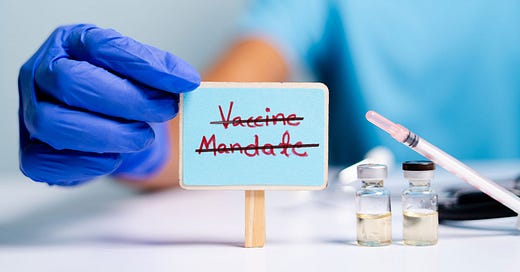A Dangerous Precedent: The Perils of Nationwide Vaccine Mandates
Balancing Public Health with Personal Liberty
A Texas law, effective February 6, 2024, serves as a significant step in protecting workers from being forced into receiving a COVID-19 vaccine as a condition of employment. Advocating for the extension of this law nationwide, and expanding it to include all vaccines, including Emergency Use Authorization (EUA) products, involves multiple facets.
The proposal to prohibit vaccine mandates—particularly those involving EUA products—aims to ensure that individuals maintain the freedom to make personal health decisions without coercion, especially in the workplace.
Here's an outline of key considerations for supporting such a policy:
Personal Autonomy and Freedom of Choice
Informed Consent: Every individual should have the right to make informed decisions about their own health and medical treatments. Mandating vaccines, particularly those under EUA, infringes on this autonomy. It's crucial that people are allowed to weigh the benefits and risks in consultation with their healthcare provider without being pressured by their employer.
Not only that, no one could actually obtain informed consent given there was no data or studies on the risks or long-term effects of mRNA injections. There were no studies on giving multiple mRNA injections, nor was there data on giving mRNA injections after recovery from infection with SARS-CoV-2.
Protecting Individual Rights: Extending protections against mandates ensures that workers cannot be forced into medical decisions that they may feel uncomfortable with, particularly when vaccines are still under emergency authorization and have not yet been fully approved by regulatory bodies.
Concerns with Emergency Use Authorization (EUA) Products
Temporary Status: Vaccines or treatments that are authorized under EUA are not fully approved by the FDA and may not have undergone the same extensive, long-term studies as fully licensed products. The risks and long-term effects of these products are still being evaluated, and individuals should have the option to opt out of such mandates.
Transparency and Safety: There is a need for complete transparency regarding the safety and efficacy of EUA products. People may have valid concerns or personal reasons for not wanting to take an EUA product, and mandating these treatments could disregard those concerns in favor of expediency.
Workplace Protections and Health Equity
Employer Overreach: While employers have a responsibility to maintain a safe workplace, mandating vaccines may overstep personal boundaries. Many individuals may have health conditions, religious beliefs, or personal reasons for refusing a vaccine. These workers should not face discrimination or be penalized for their decisions.
Promoting Inclusivity: Extending the law to protect individuals from vaccine mandates ensures that all employees, including those who may have specific health concerns, religious objections, or personal beliefs, are not unfairly excluded from employment opportunities.
Public Health and Scientific Evidence
Balancing Public Health and Individual Rights: Proponents of vaccine mandates often argue that they are essential for public health. However, ensuring personal freedom does not necessarily undermine efforts to protect public health. There are other ways to safeguard health in the workplace, such as testing and improving ventilation, without mandating vaccines.
Encouraging Voluntary Participation: Encouraging people to get vaccinated through education, incentives, and providing access to vaccines is likely to be more effective in the long run than mandates. A voluntary approach may result in higher levels of trust and cooperation among the public, leading to greater vaccination rates.
Precedent for Mandate Prohibitions
Texas as a Model: Texas’s new law can serve as a model for other states and even the federal government, illustrating the growing recognition of the need for greater personal choice when it comes to medical procedures. Expanding this law nationwide would give workers the protection they need from potentially invasive workplace policies.
State Rights: While some may argue for the need for federal intervention, state-level legislation has proven effective in protecting citizens' rights against mandates. Each state should have the autonomy to determine its own approach to public health policies, especially when they impact individual freedoms.
Economic Impact and Workforce Stability
Avoiding Workforce Disruption: Vaccine mandates, especially those that target new or ongoing employment, have caused significant disruptions in industries, particularly healthcare, education, and transportation. The threat of losing one's job over a medical decision could lead to workforce shortages and economic instability. Protecting workers’ rights to choose would help maintain a stable, functioning workforce.
Support for Employees with Concerns: By making vaccine mandates illegal, employers would be encouraged to support their employees in other ways, such as providing accommodations for those who cannot or choose not to be vaccinated, fostering a more inclusive and supportive work environment.
Legal and Ethical Considerations
Rights of Workers and Employers: While employers have a vested interest in maintaining workplace safety, there are legal limits to what can be required of employees, particularly when it comes to medical decisions. The ethical implications of mandating medical treatments should be carefully considered, with respect for both personal and workplace rights.
Precedent in Health and Safety Laws: While previous public health emergencies have led to mandates in certain circumstances (e.g., influenza vaccines for healthcare workers), the ethical debate surrounding mandatory vaccinations continues. In light of recent legal challenges to vaccine mandates, repealing laws that allow for such mandates in the workplace can ensure that protections remain in place.
Conclusion:
The prohibition of vaccine mandates, particularly for products under Emergency Use Authorization, should be extended nationwide to protect individual freedom and ensure that medical decisions remain personal. While public health is undeniably important, this protection allows individuals to make informed choices regarding their health without undue pressure from employers or the government. By emphasizing education and voluntary participation, we can create a system that respects both public health and personal liberty, fostering a more inclusive, respectful, and balanced approach to healthcare policy.







Thank you for sharing your thoughts and concerns regarding the vaccine mandates. I hope and pray that more and more people awaken to take back their rights regarding vaccines mandates. A job is not worth my health.
STOP the madness!!